Saturday, June 24, 2006
Back to Basics
 “When the world wearies and society ceases to satisfy, there is always the garden.”
“When the world wearies and society ceases to satisfy, there is always the garden.” --Minnie Aumonier
... And hasn't society failed to satisfy lately! I am finding myself in a real funk this week. I have taken steps: planted zinnias, Shasta daisies, cleomes, sun begonias, impatiens, California poppies, rununculus, verbena...
I've been reading Greg Palast's book too late into the night this week, my stubbornly dutiful self wanting to know as much as possible. It ain't for sissies. There are the outrageous revelations and the dulling confirmation of long-held suspicions. It's hard to take them all. More on that later in the week.
Fortunately, I work in a library with truly delightful colleagues, so when I realized how much I needed to lighten up, I had only to ask them what I could read to regain some balance. (Grant me the serenity to accept the things I cannot change, the courage to change those I can, and the wisdom to know the difference--a big order, that last.)So now I have a copy of My Year of Meats, by Ruth L. Ozeki to tip me in a new direction.
If it will just stop raining, I should be able to get out and play in the yard again. There the garden will be.
Thursday, June 22, 2006
Access to Evil
 I ought to go back to reading fiction. I'm getting too pissed off from the non fiction I've been reading, excellent as it may be.
I ought to go back to reading fiction. I'm getting too pissed off from the non fiction I've been reading, excellent as it may be.Take Greg Palast's latest book, Armed Madhouse. Palast is doing the kind of work all reporters should be doing in exposing the multiple and specific outrages of the war in Iraq. Stephen Colbert is right--most reporters have turned into stenographers for the administration, worrying about losing their "access" to these creeps and then docilely writing down whatever bullshit they happen to dish up. They think they're being "objective" by including a comment from an administration critic.
It's pathetic. But the truth hurts, too. I remember that Americans became numbed by so much information during the Viet Nam war, back when reporters were reporting. The "advantage" was that when the draft was in place, the sense of sacrifice was more widely distributed; more people stood to lose loved ones. Discontent with the war started with the students who were threatened with the draft and traveled up the ladder to their parents who didn't want to lose their kids. It was easier to build an anti-war movement from that broader base.
With an all-volunteer military (if you can call it that when the innocents who signed up for the National Guard find themselves trapped into extended tours of duty) the identification with loss runs along narrower lines. And since we've made no other shared sacrifices, gas prices aside, we can't see the kind of protest that wider discontent would trigger.
I'll turn to some fiction once I've finished Palast's book, but I do encourage you to buy a copy. Frankly, we should be supporting the kind of work that Greg Palast is doing. If you don't have the heart to read all the bad news yourself, donate a copy to your local library. Give it as a gift to one of your hard truth-fiend friends. I can tell you that you ain't gonna get information like this anywhere else.
I'll focus on a couple of dreadful tidbits in upcoming blogs. As Bette Davis said in one of her long-ago flicks, Fasten your seat belts. It's going to be a bumpy night.
Thursday, June 15, 2006
A Love that Dares Not Speak Its Name
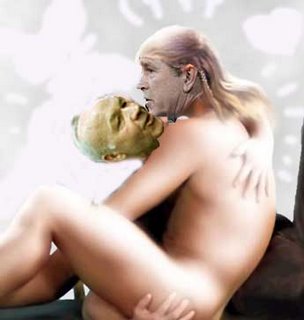 I was busy Wednesday, celebrating Flag Day as I always do, and I very nearly missed this item on page C3 of the New York Times: 2 Utilities to Pay Enron $50 Million in Settlement: Energy Was Bought, but Never Delivered. I thought it belonged in the Relationships section of People magazine. It's got all the elements of a passionate love story: the rich and powerful who are powerless in their love for each other and can only show their feelings in secret ways.
I was busy Wednesday, celebrating Flag Day as I always do, and I very nearly missed this item on page C3 of the New York Times: 2 Utilities to Pay Enron $50 Million in Settlement: Energy Was Bought, but Never Delivered. I thought it belonged in the Relationships section of People magazine. It's got all the elements of a passionate love story: the rich and powerful who are powerless in their love for each other and can only show their feelings in secret ways.It's really sweet. Two small utility companies are set to pay for energy that Enron will never deliver under the auspices of the Federal Energy Regulatory Commission. Along with the the free $50 million will come other Enron treats, including an agreement that the feds will not investigate claims against Enron for manipulating energy prices. Why, the settlement might even allow the destruction of evidence needed for proving that Enron cheated customers. You could get distracted by the bothersome little details of the impact on the small utility companies and totally miss the romance.
I, for one, am thankful to know that Dubya still cares deeply for Kenny-Boy, even though they can't meet publicly.
I know that some of you are all a-twitter about what seems to be an outlandish working of the wheels of justice. How can this be? you ask.
It's all about contracts. Enron sold this fuel, and now it wants its money. For some reason the fact that it didn't follow through and deliver the actual fuel is moot. It would have liked to deliver the fuel, but whoops--it didn't stay in business. Its contract writers even had written in $167 million in contract termination fees for these very transactions, so you see the two utilities have gotten themselves a real bargain! Think of all the money they saved!
The entire Enron story has been a tale of undeclared passion and secret meetings all along. Dubya showed that he cared in so many ways: he fought against price caps on the price of electricity in California when Enron was artificially driving up the price of electricity by manipulating the supply. He gave Lay lots of say in the development of the administration's energy policy, and even replaced the chairman of the Federal Energy Regulatory Commission after he began to investigate Enron's finance schemes (I love it when he sticks up for his honey that way!!!) THEN he got his NSC staff to pressure India to buy a big ol' Enron power plant for $2.3 billion.
Sigh! I wish I had a staff to push countries around on behalf of my beloved! All I can do is wash the dishes n' pull weeds n' take her out to dinner now and then.
It's just a darned shame that not very many people are as romantic as I am. Some might even find this story offensive.
I pity them.
Wednesday, June 14, 2006
Coulter Fails Physical, Will Stick to Day Job
 Publicists for Ann Coulter acknowledged today that she had failed her physical and would not be participating in the Women's World Wrestling Federation (WWWF) after all.
Publicists for Ann Coulter acknowledged today that she had failed her physical and would not be participating in the Women's World Wrestling Federation (WWWF) after all.Coulter, it turns out, is biologically a man.
In an effort to make the most of her current noteriety, Coulter had indicated an interest in becoming part of the WWWF circuit. A source close to Coulter said that she had hoped to become a heavy leather favorite.
"Alas, it isn't to be," the same source disclosed. "When Ann emerged from her federation-required hormone, steroid, and drug testing sessions, she did so as a man."
The revelation came as no surprise to Coulter watchers, who had long been suspicious of an Adam's apple that Coulter's publicist had tried to explain away as a goiter.
Can I Get a Witness? A Rummy Retro
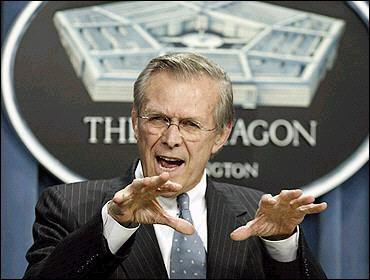
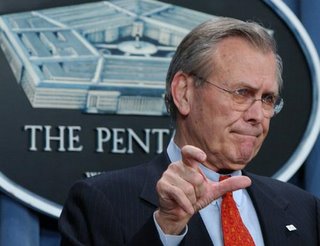

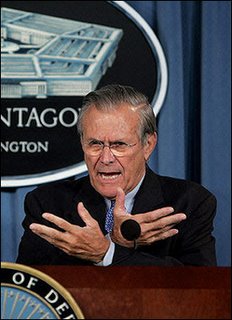


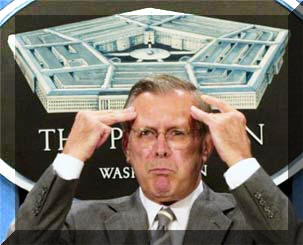 Upon hearing the news that Rummy has ordered all the press from Guantanamo, I found myself contemplating this dynamic public servant. What better way to pay tribute to this chicken hawk than to do a little photo rectal-spective of the thrilling photo-ops he's provided the American People with all these years?!
Upon hearing the news that Rummy has ordered all the press from Guantanamo, I found myself contemplating this dynamic public servant. What better way to pay tribute to this chicken hawk than to do a little photo rectal-spective of the thrilling photo-ops he's provided the American People with all these years?! Here we find Rummy casting a whammy on dissident generals, estimating the size of his penis, and showing his junior high speech coach that he has never stopped recognizing the importance of Meaningful Hand Signals in making his Point. I shiver in awe!
You make those lies come alive, Rummy! You da bomb!
Tuesday, June 13, 2006
Rove Explained
 How to explain Rove's avoidance of prosecution in the Valerie Plame case? I find myself flipping through the rolodex of disciplinary options.
How to explain Rove's avoidance of prosecution in the Valerie Plame case? I find myself flipping through the rolodex of disciplinary options.Theological? Rove will eventually turn on a spit in hell? Too abstract, uncertain, unsatisfying.
Legal? Rove was actually or technically innocent of all charges? Probably not.
Political? Somebody took the fall to preserve Rove's evil genius for the midterm elections and will be pardoned before s/he has to actually serve a day? Possibly.
Criminal? Somebody dug up something on Patrick Fitzgerald, who has now lost the book he so faithfully played by? Maybe.
Scientific? The best possibility of all: here's the chemical formula for slime. The White House isn't much on science, but it knows what it likes. Slime makes its political world go round. Besides, there's always a scientist for sale. The administration has a little dude in the White House basement brewing up vats of slime on a daily basis.
Don't be too hard on Jason Leopold. He's young, ambitious, and still capable of hope.
Sunday, June 11, 2006
More Inconvenient Truth
 This is too important not to be run here. I'll be getting Palast's book soon. Why isn't the New York Times on top of this? (That's a rhetorical question.)
This is too important not to be run here. I'll be getting Palast's book soon. Why isn't the New York Times on top of this? (That's a rhetorical question.)Unreported: The Zarqawi Invitation By Greg Palast
Friday 09 June 2006
They got him - the big, bad, beheading berserker in Iraq. But, something's gone unreported in all the glee over getting Zarqawi - who invited him into Iraq in the first place?
If you prefer your fairy tales unsoiled by facts, read no further. If you want the uncomfortable truth, begin with this: A phone call to Baghdad to Saddam's Palace on the night of April 21, 2003. It was Secretary of Defense Donald Rumsfeld on a secure line from Washington to General Jay Garner.
The General had arrives in Baghdad just hours before to take charge of the newly occupied nation. The message from Rumsfeld was not a heartwarming welcome. Rummy told Garner, Don't unpack, Jack - you're fired.
What had Garner done? The many-starred general had been sent by the President himself to take charge of a deeply dangerous mission. Iraq was tense but relatively peaceful. Garner's job was to keep the peace and bring democracy.
Unfortunately for the general, he took the President at his word. But the general was wrong. "Peace" and "Democracy" were the slogans.
"My preference," Garner told me in his understated manner, "was to put the Iraqis in charge as soon as we can and do it in some form of elections."
But elections were not in The Plan.
The Plan was a 101-page document to guide the long-term future of the land we'd just conquered. There was nothing in it about democracy or elections or safety. There was, rather, a detailed schedule for selling off "all [Iraq's] state assets" - and in Iraq, that's just about everything - "especially," said The Plan, "the oil and supporting industries." Especially the oil.
There was more than oil to sell off. The Plan included the sale of Iraq's banks, and weirdly, changing its copyright laws and other odd items that made the plan look less like a program for Iraq to get on its feet than a program for corporate looting of the nation's assets. (And indeed, we discovered at BBC, behind many of the odder elements - copyright and tax code changes - was the hand of lobbyist Jack Abramoff's associate Grover Norquist.)
But Garner didn't think much of The Plan, he told me when we met a year later in Washington. He had other things on his mind. "You prevent epidemics, you start the food distribution program to prevent famine."
Seizing title and ownership of Iraq's oil fields was not on Garner's must-do list. He let that be known to Washington. "I don't think [Iraqis] need to go by the U.S. plan, I think that what we need to do is set an Iraqi government that represents the freely elected will of the people." He added, "It's their country, their oil."
Apparently, the Secretary of Defense disagreed. So did lobbyist Norquist. And Garner incurred their fury by getting carried away with the "democracy" idea: he called for quick elections - within 90 days of the taking of Baghdad.
But Garner's 90-days-to-elections commitment ran straight into the oil sell-off program. Annex D of the plan indicated that would take at least 270 days - at least 9 months.
Worse, Garner was brokering a truce between Sunnis, Shias and Kurds. They were about to begin what Garner called a "Big Tent" meeting to hammer out the details and set the election date. He figured he had 90 days to get it done before the factions started slitting each other's throats.
>
But a quick election would mean the end of the state-asset sell-off plan: An Iraqi-controlled government would never go along with what would certainly amount to foreign corporations swallowing their entire economy. Especially the oil. Garner had spent years in Iraq, in charge of the Northern Kurdish zone and knew Iraqis well. He was certain that an asset-and-oil grab, "privatizations," would cause a sensitive population to take up the gun. "That's just one fight you don't want to take on right now."
But that's just the fight the neo-cons at Defense wanted. And in Rumsfeld's replacement for Garner, they had a man itching for the fight. Paul Bremer III had no experience on the ground in Iraq, but he had one unbeatable credential that Garner lacked: Bremer had served as Managing Director of Kissinger and Associates.
In April 2003, Bremer instituted democracy Bush style: he canceled elections and appointed the entire government himself. Two months later, Bremer ordered a halt to all municipal elections including the crucial vote to Shia seeking to select a mayor in the city of Najaf. The front-runner, moderate Shia Asad Sultan Abu Gilal warned, "If they don't give us freedom, what will we do? We have patience, but not for long." Local Shias formed the "Mahdi Army," and within a year, provoked by Bremer's shutting their paper, attacked and killed 21 U.S. soldiers.
The insurgency had begun. But Bremer's job was hardly over. There were Sunnis to go after. He issued "Order Number One: De-Ba'athification." In effect, this became "De-Sunni-fication."
Saddam's generals, mostly Sunnis, who had, we learned, secretly themselves hunted and arrested. Falah Aljibury, an Iraqi-born US resident who helped with the pre-invasion brokering, told me, "U.S. forces imprisoned all those we named as political leaders," who stopped Iraq's army from firing on U.S. troops.
Aljibury's main concern was that busting Iraqi collaborators and Ba'athist big shots was a gift "to the Wahabis," by which he meant the foreign insurgents, who now gained experienced military commanders, Sunnis, who now had no choice but to fight the US-installed regime or face arrest, ruin or death. They would soon link up with the Sunni-defending Wahabi, Abu Musab al-Zarqawi, who was committed to destroying "Shia snakes."
And the oil fields? It was, Aljibury noted, when word got out about the plans to sell off the oil fields (thanks to loose lips of the US-appointed oil minister) that pipelines began to blow. Although he had been at the center of planning for invasion, Aljibury now saw the greed-crazed grab for the oil fields as the fuel for a civil war that would rip his country to pieces:
"Insurgents," he said, "and those who wanted to destabilize a new Iraq have used this as means of saying, 'Look, you're losing your country. You're losing your leadership. You're losing all of your resources to a bunch of wealthy you over and make your life miserable.' And we saw an increase in the bombing of oil facilities, pipelines, of course, built on - built on the premise that privatization [of oil] is coming."
General Garner, watching the insurgency unfold from the occupation authority's provocations, told me, in his understated manner, "I'm a believer that you don't want to end the day with more enemies than you started with."
But you can't have a war president without a war. And you can't have a war without enemies. "Bring 'em on," our Commander-in-Chief said. And Zarqawi answered the call.
Greg Palast is the author of Armed Madhouse out this week from Penguin Dutton, from which this is adapted. Armed Madhouse: Who's Afraid of Osama Wolf?, China Floats Bush Sinks, the Scheme to Steal '08, No Child's Behind Left and other Dispatches from the Front Lines of the Class War.
Saturday, June 10, 2006
An Invitation to My Hero
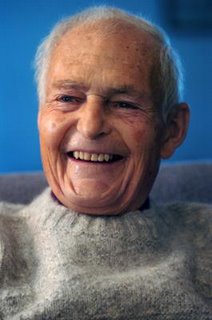 Who was it who said that, as we get older, heroes become harder to find and are never more important to have?
Who was it who said that, as we get older, heroes become harder to find and are never more important to have?Afer 9/11 I became weary of the word hero... it seemed that we were desperate to imprint everyone with that word. True, we witnessed many acts of courage in those anguished times, but to me, hero was a word reserved for people who lived a lifetime of courage and honor for the greater good.
I have long maintained that there is a cosmic conspiracy tilted toward our happiness if we will only pay attention, will be entirely ready for common miracles to occur. So it was over a year ago that I stumbled into a medical practice management job for a man who needed someone quickly to pick up where his previous helper had left off. He was the husband of my partner's former boss, and I went on her encouragement that I might like to work for "a real person, for a change."
It wasn't a typical interview. It was a two-hour conversation with a man so filled with the joy of living, so ready to scoop up adventure, challenge, and the love of his fellows that I observed, "You're the most interesting man I've ever met." I worked for him in the final months of his practice as the chemotherapy targeted at his prostate cancer failed to hold back the tide that would take him, and he and his wife would cram in as many precious moments together as they could before his inevitable passing.
I was one of the last people to fall in love with Doc. In fact, I fell in love with the whole crew--the wife, the kids, the grandkids. His big house was full of family. The grandkids still in school were at the house every day, many of their friends in tow, some of whom would never know a father or a grandfather as interested in them as he would be. He scuffed himself up from tearing around the park by his house on roller blades. His grown children were in and out on a nearly daily basis. No one could get enough of Doc.
The practice had dropped off in his last years, although there were patients who refused to change doctors, hoping that he would outlast them and they would never have to go to those little corporate bastions of indifference that have replaced the person-to-person care that Doc provided.
And what care it was! His appointments always ran over. He strongly believed that knowledge of his patients was essential to their medical care. Down the hall you could hear the loud laughter, the occasional silence that accompanied the difficult confidence. I could see that the time that they spent with Doc was as healing as any prescription he might write, any test that he might order.
It was while working for him that I faced my own problem with alcohol and joined AA. His mind was as fresh as mountain air, and I saw in him the dad I'd never had. It seemed only right to get clear, in part because my life was draining away, in part because I was close to him. Mine was another life that he had a hand in saving.
Last fall Doc finally had to admit that he would no longer be able to practice. He couldn't trust his judgment on the heavy pain medications he would now have to take. It was the hardest decision he ever had to make, I suspect. I spent my last weeks in his practice mostly listening to the patients he could no longer serve, who needed to share the sacred stories that comprised their years with him. They told me about house calls to houses without a front door--no problem, he just climbed through the window. They told me about cases of domestic violence where he had to talk down an enraged husband and then tackle him to get him out of the way in order to provide care. They told me about heart to heart talks that had resulted in their changing their habits in life saving ways. They shared stories about free treatments, free physicals for kids who couldn't afford them. They told me that they couldn't let him go because, as far as they were concerned, no one else would ever give a damn.
Doc was a lifelong Republican, a passionate advocate of personal responsibility. However, in his last year he noted with increasing discomfort the ever widening gap between the rich and the poor. He threw away the letters from his state's medical association pushing the cause of tort reform. Though he was never sued for malpractice, he didn't like the direction that the medical establishment was going to undermine patients' rights. In earlier years, the state's party had asked him to run for Congress more than once, recognizing the personal charisma that would translate into landslide victories. I'm glad he never heeded that call. Because he was constitutionally incapable of lying, he would have been miserable in a political climate. He was a great one for leveling with the people in his life--never unkindly, but never holding back what he considered to be an essential truth.
Doc nearly left us at Christmas time. I went up to his bedroom during one of those difficult times and found his bed full of teenagers who had grown up with the family. One guy was in tears as he told him all that Doc had meant to him. The others rollicked, sure that laughter was the best medicine. When his whole family crammed into the house for the holiday, the love crowded out the cancer. The long months ahead would repeat that phenomenon, and I began to think that he would ride the tide of life forever, borne on that love.
Doc had his dysfunctions, as all great men do. He was stubborn, dramatic, and probably not interested enough in money. But what a short list for a man with such a long list of virtues! And any of those faults were available as virtues under the right conditions.
This afternoon his friends and family will gather in the park across from his house to dedicate a plaque to him. The ceremony was only days away from his passing. "He'd have loved to be there," his wife of 53 years told the local paper.
Oh, Doc. Please come anyway. You'll love it. And bring your roller blades. Nothing can hurt you now.
Wednesday, June 07, 2006
Sure Beats Disney World
 Win or lose, it's inspiring to see Americans turning out to participate in the democratic process. Take the debate on gay marriage kicked back into life ever so briefly by President Bush. While the Senate didn't pass the measure, at least one family was able to come to the nation's capitol for a truly educational experience and an opportunity to underscore some key values:
Win or lose, it's inspiring to see Americans turning out to participate in the democratic process. Take the debate on gay marriage kicked back into life ever so briefly by President Bush. While the Senate didn't pass the measure, at least one family was able to come to the nation's capitol for a truly educational experience and an opportunity to underscore some key values:"If we didn't believe in miracles, we wouldn't have spent our vacation money to come here," said Sandra Rodrigues of Utah, who with her family has been standing outside the Russell Senate Office Building all week, shouting at senators and displaying signs urging "Stop Same Sex Marriage: It Endorses Masturbation." "If same-sex marriage is endorsed," she explained, "then you're going to have children think it's just another option to have pleasure."
It was indeed worth the trip, just to remind the kids that they shouldn't count all their options for pleasure before they hatch.
Taking It on the Road
 Declaring that "music is the universal language," Secretary of State Condoleezza Rice has announced plans to make use of her performing talents on all future diplomatic missions abroad.
Declaring that "music is the universal language," Secretary of State Condoleezza Rice has announced plans to make use of her performing talents on all future diplomatic missions abroad.Dr. Rice will use as her program the top ten selections on her Ipod, from piano concerti by Mozart and Brahms to "Rocket Man" by Elton John and "Celebration" by Kool and the Gang. She'll begin her set with a hard driving version of "Respect." "I want the audience to know that I speak for America, speak for my husb-- the President."
Here Dr. Rice models her ensemble for the finale, which will feature "Sunshine of Your Love." It is technologically enhanced, she acknowledges, because "I want other nations to know that America is still strong in the engineering sciences."
"I will do everything I can to ensure that America's friends will remember this event for a long, long time," she says.
Monday, June 05, 2006
New American Gothic
 What fun it wasn't today, listening to America's Dear Liar begin his latest "defense of marriage" via the proposed constitutional amendment. He blamed "activist judges" for undermining marriage as an institution comprised solely of one man and one woman.
What fun it wasn't today, listening to America's Dear Liar begin his latest "defense of marriage" via the proposed constitutional amendment. He blamed "activist judges" for undermining marriage as an institution comprised solely of one man and one woman.What a crock. Social institutions at their most vital reflect the changing realities of the society they attempt to structure. With a divorce rate among heterosexuals at one out of two marriages (this rate at its worst, ironically, in red states rather than blue), it's clear that something hasn't been working in traditional marriages for quite some time. Rather than devote some leadership to analyzing the new realities and studying the ways in which gays are at a disadvantage without some legal status, or address the problems leading to the current divorce rate, the Right hopes to legislate away the deep ties that many gay couples share and ignore the problems of a significant portion of its heterosexual citizens and their children.
It won't work. That Bush is in bed with the Fred Phelpses of the world while he reaps the consequences of his disastrous policies with gutter approval ratings shows the extent of his current desperation. No doubt his statements will play well to the Christian Right, but an increasing percentage of the American public is unable to see just how the love between two people of the same gender threatens the love between two people of differing genders in any significant or meaningful way.
Most Americans, the Bushes included, no doubt, know gay couples, and that knowledge has short-circuited the demonized stereotypes that hate groups like Phelps and his fellow crazies are struggling so valiantly to propagate and maintain.
In the meantime, American soldiers are dying in the chaos of the "liberated" Iraq, and the environment is going down the toilet. Global warming is so obvious that even conservatives are beginning to acknowledge that they, too, would like a cleaner environment, even as Bush panders to polluters and squanders the economic resources we'll need on tax cuts for the rich.
Everywhere these unholy matrimonies attest to the disgrace that is the Bush Administration.
Democrats, get your act together. Your absence of leadership doesn't make you look like much, either.
Saturday, June 03, 2006
Mark of Excellence?
 I'm posting this to replace the really dirty song I wrote about Ken Lay ("Lay, Kenny Lay") which reveals shockingly even to me what a nasty little mind I have.
I'm posting this to replace the really dirty song I wrote about Ken Lay ("Lay, Kenny Lay") which reveals shockingly even to me what a nasty little mind I have.No matter. GM's latest obscenity falls within more acceptable social norms (ironically), and it bears recording, anyway. It's good for us Americans to continue to note our capacity for national chumpitude.
Beset by a declining share of the market, GM is offering a special deal on some of its gas-hungry critters: a voucher which guarantees a price of $1.99 at the gallon for the year after the buyer has foolishly signed the sales agreement.
I can see Chuck Chump swaggering out of the dealership and bragging to his buddies over a Coors, "So, how much ya payin' for gas, Chuzzlewit, 'bout $3.25 a gallon? Well I got a deal for $1.99!" He confidently waits for Chuzz's jaw to drop.
Of course, he has a 9,000 gallon tank, but never mind that.
GM prides itself on the breadth of its product line, which means that it will never be able to devote sufficient resources to developing gas efficient models. Its biggest seller is still the Impala, which is the best selling American car, but even it lags behind several Toyota and Honda models. Restructuring doesn't seem to be part of its long range plan.
I wonder if it's still dangerous to drive in those Michigan company towns in imports, or if GM has laid off so many workers for jobs that went south that it no longer raises an eyebrow.
What a sorry mess.


